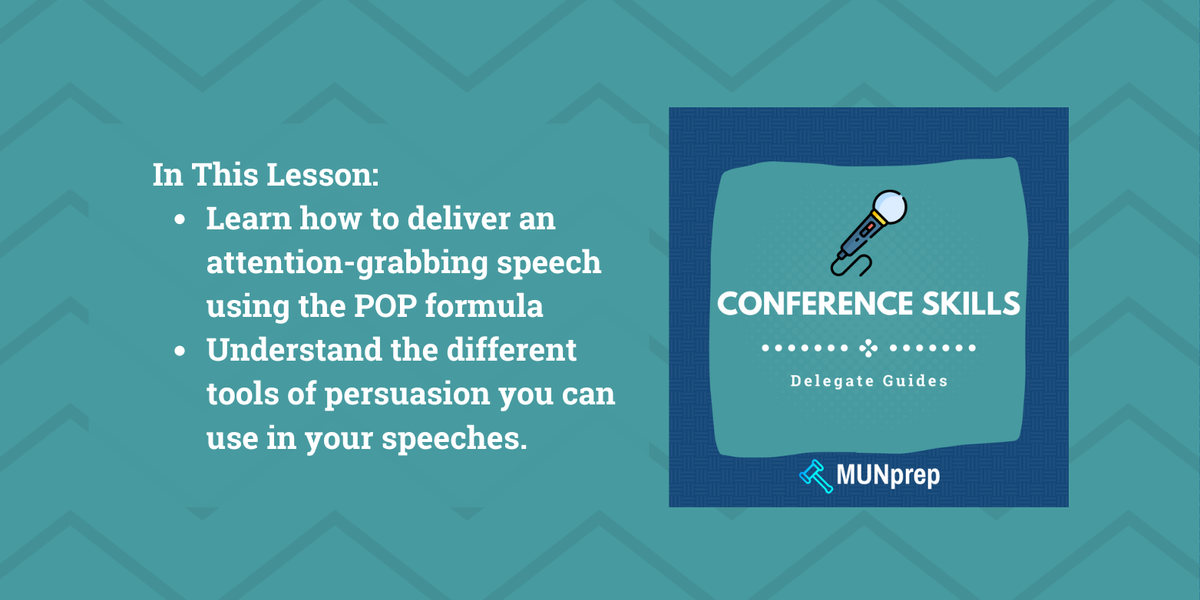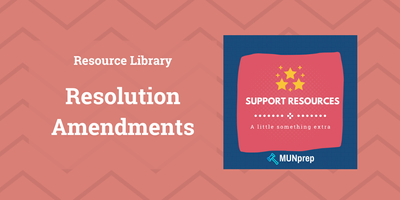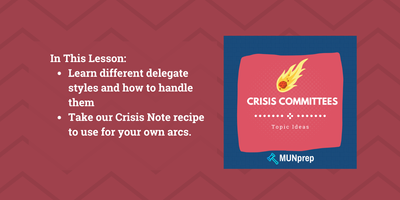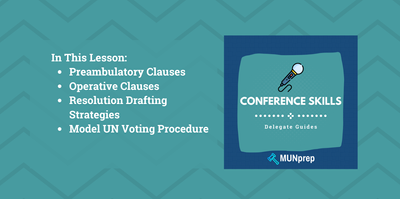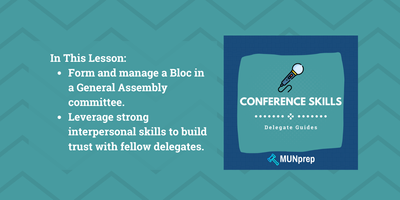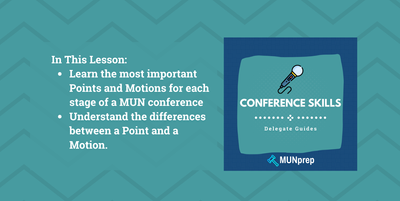How Does Model UN Work? - The Conference Weekend
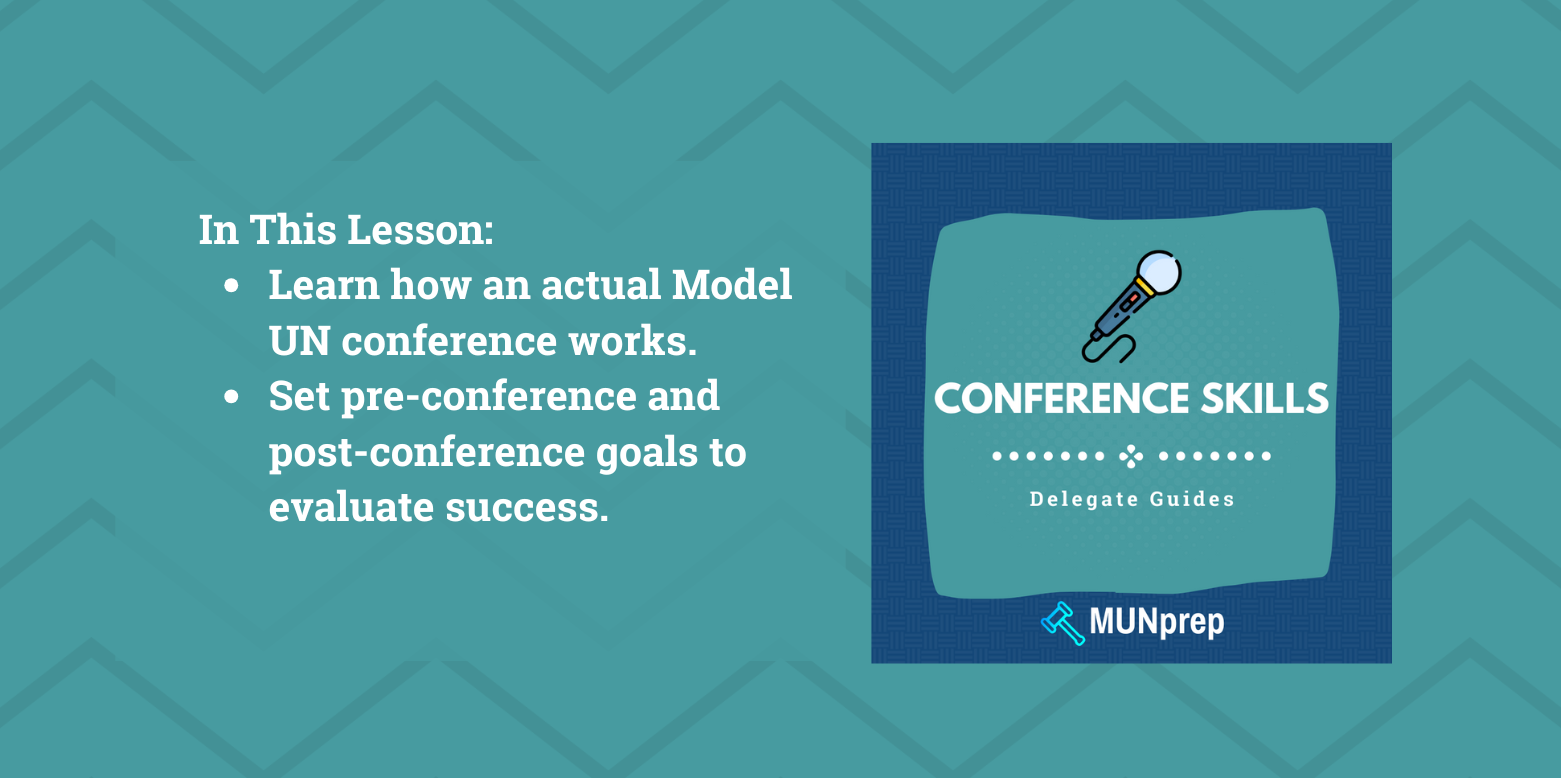
Now it’s time to bring together all of your hard work – You’ve learned the basics of MUN and gone through the Conference prep checklist. But how does it actually work once you actually get to a conference?
Today we're moving on from just talking about conference prep and walking you through exactly what you can expect during a Model UN conference. We'll show you:
- How a MUN conference works
- What you should do at every stage of the conference
- How to set goals for your conference experience.
Let's get started!
How Does a MUN Conference Work?
A Model United Nations conference brings together delegates from around the world to discuss and propose solutions to real-life international issues. Over the course of a few days, you’ll research global problems, hone your public speaking skills, and practice consensus-building through diplomacy.
At its core, MUN is about collaboration and learning—everyone is there to grow, so don’t hesitate to engage with others, share ideas, and make friends along the way.
There are two sides to every MUN conference:
- The Serious Side
- The Fun Side
The Serious Side
When you first step into your committee sessions, you’ll find yourself surrounded by other students wearing suits, you'll be discussing real-world problems and working together to solve it.
This will happen through a structured flow of debate that mirrors real UN procedures. You'll start with a speakers list, move to a range of moderated and unmoderated caucuses, and finally vote on your resolution.
To really nail down the serious side of MUN, you'll need to develop your skills in
Fortunately, MUN isn't only suits and debates, there's also a completely different, much more social side to things as well:
The Fun Side
Despite the emphasis on formal debate, a MUN conference also features a number of social elements designed to help you connect with fellow delegates.
- Opening ceremonies often set a celebratory tone, with speeches from keynote guests and a sense of excitement for the days ahead.
- Delegate socials—which can range from casual mixers to themed events—give you a chance to relax, let your guard down, and meet people outside your committee.
- Traveling with a team to the conference offers its own benefits, whether you’re on a bus ride discussing last-minute points of policy or exploring a new city in your free time.
- Group chats to keep everyone informed and coordinated within your committee. These channels can lead to lasting connections, allowing you to keep in touch with people from all over the world.
Overall, this fun side of MUN is meant to ensure that conferences remain inclusive, energetic, and memorable.
If you can walk the line between seriousness and fun-ness you'll set your self up for an awesome MUN experience!
Trying to figure out what you should pack to your next conference? Check out our packing list here!
Day by Day Breakdown of a MUN Conference
Each day of your conference will have slightly different priorities, here’s how the debate will progress each day in a typical general assembly committee:
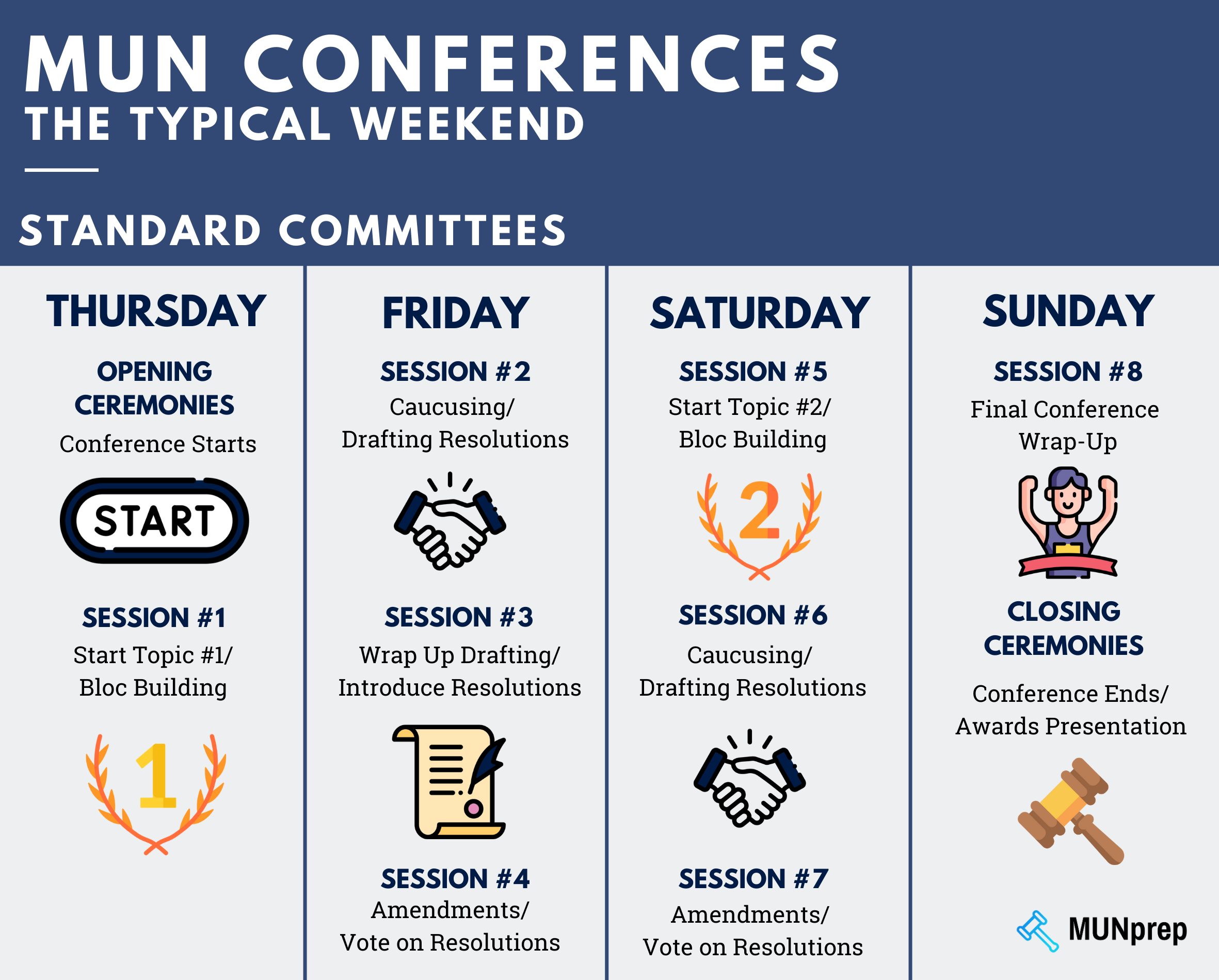
Day 1 - Opening Day
Significance: Setting the Stage
- First Committee Session: Initial sessions are crucial for setting the groundwork. Delegates deliver their opening speeches, presenting their country’s stance on the issues. This is your first chance to make an impression.
Key Actions:
- Make sure you have all necessary documents and materials.
- Deliver a strong and confident opening speech.
- Start networking with other delegates and identifying potential allies.
Day 2 - Middle Day
Significance: Building Momentum
- Moderated and Unmoderated Caucuses: These sessions are the heart of the conference. Debates become more detailed, and delegates engage in both formal and informal discussions. It's during these sessions that alliances are formed and ideas are exchanged.
- Drafting Resolutions: Much of the work on resolutions happens on these days. Delegates collaborate to draft working papers that will evolve into draft resolutions.
Key Actions:
- Actively participate in both moderated and unmoderated caucuses.
- Work diligently on drafting, negotiating, and revising draft resolutions.
- Continue building relationships and seek consensus with other delegates.
Day 3 - Closing Day
Voting Procedures: On the final day, resolutions that have been thoroughly debated and refined are put to a vote. The outcome of these votes determines which resolutions are formally adopted by the committee.
For delegates aiming to win awards, the final day is often less critical in terms of influencing the chairs’ decisions. By this stage, decisions regarding awards are typically based on your performance throughout the conference rather than the outcome of the final resolution vote.
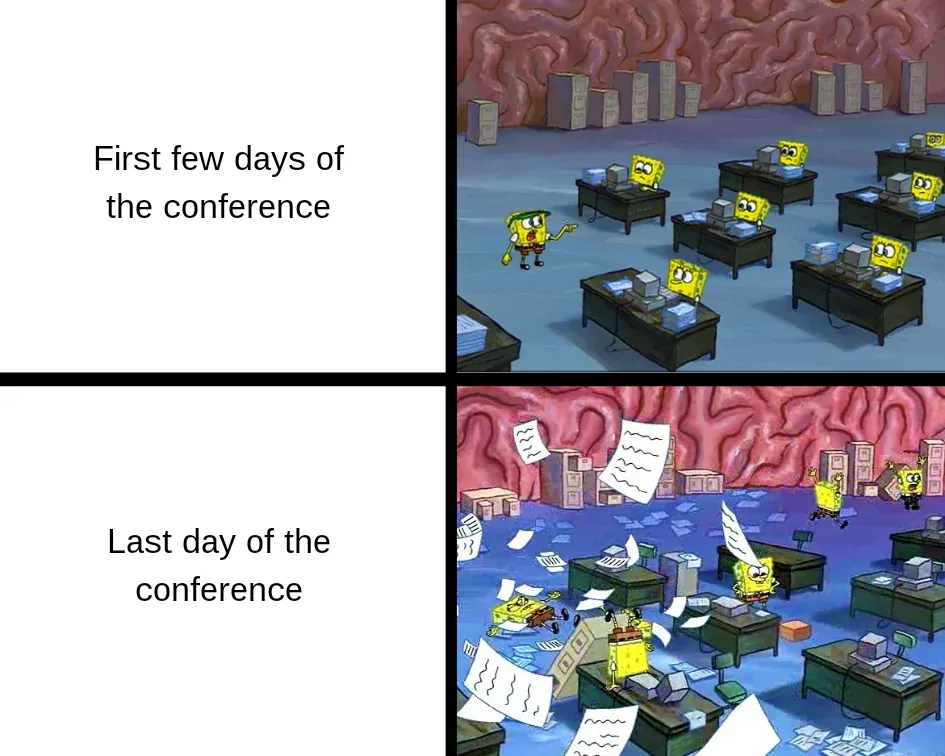
Staying healthy
Participating in a Model UN conference is hard work and can be quite mentally tiring – Nobody said that the life of a professional diplomat was easy!
Make sure that you do everything you can during the weekend to stay healthy. Bring food and water to the committee and try your best to get a good night’s sleep.
Having the energy to keep debating by Saturday is one of the most important things you can do.
Your Priorities as a Delegate
In Model UN, it can always be useful to take some time for reflection, there are three categories to consider:
Pre-conference Strategy
A good game plan sets you up for success. While you may need to adapt once things get started, an initial road map can help you stay focused and proactive rather than reactive. Think of it as a flexible blueprint—an outline of how you’ll navigate committee dynamics, direct debate toward your solutions, and work with (or around) other delegates.
Key Elements of Your Strategy
- Identify Clear Objectives
What do you hope to accomplish by the end of the first session—and ultimately, by the end of the conference? Perhaps you want your resolution to be the main basis for negotiation, or maybe you aim to shape the overall direction of debate. - Plan for Different Scenarios
Committee rooms are unpredictable. Draft a Plan A, but also have a Plan B or even Plan C ready. Be prepared to pivot if a new coalition forms or if the topic discussion moves in an unexpected direction.- Work with other delegates on your team to help you draft these plans.
- Understand the Bloc Dynamics
- Allies and Likely Partners: Which countries share similar policies or common interests with you?
- Potential Opposition: Who is likely to challenge your positions, and how can you address or neutralize those challenges diplomatically?
- Delegate Personalities: Beyond country positions, watch out for delegates who might be overly combative or those who could monopolize the discussion.
- Set Roles in a Double Delegation
If you’re working with a partner, decide how you’ll split tasks:- Speaking vs. Negotiating: Who is more comfortable delivering speeches? Who excels at one-on-one diplomacy?
- Research vs. Drafting: Assign tasks based on who’s better at detail-oriented writing versus big-picture strategizing.
- Strengths and Weaknesses: Play to each other’s strengths and cover each other’s gaps.
- Establish Your Non-Negotiables
Determine the core elements of your policy stance that you cannot compromise on. This helps you stay consistent and prevents you from conceding key points under pressure.
Setting Personal Goals
Model UN offers both immediate takeaways and long-term benefits. These will vary quite alot depending on your level of experience. Consider splitting your goals into short-term and long-term categories.
Short-Term Goals
Long-Term Goals
Post-Conference Evaluation
Reflection after a conference is where you turn your experience into actionable insights. Consider the following steps:
- Self-Assessment
- Did you meet your short-term goals?
- What were your key strengths (research, speaking, negotiation)?
- What do you want to improve (drafting resolutions, building alliances, managing nerves)?
- Gather Feedback
- Talk to fellow delegates or your advisor about how they perceived your performance.
- Ask the Chair or your peers for advice on any areas that might still feel challenging.
- Look Ahead
Based on your evaluation, set updated goals for your next conference. Maybe you want to focus more on policy depth or refine your negotiation techniques. Creating a small checklist of “things to do differently” can help keep your next conference experience even more positive and productive.
Final Thoughts
Your first conference—or any new MUN experience—can feel overwhelming, but that’s part of the growth process. Don’t pressure yourself to be flawless. Instead:
- Stay Curious: Observe how more seasoned delegates handle complex scenarios and take note of what techniques resonate with you.
- Be Adaptable: Model UN rarely goes exactly as planned; adaptability is often the difference between frustration and success.
- Seek Guidance: Don’t hesitate to reach out to your teacher, head delegate, or conference staff for help. Asking questions is a sign of initiative and eagerness to learn.
- Enjoy the Experience: Embrace the collaboration and camaraderie that makes MUN unique. The skills you develop—public speaking, negotiation, leadership—have life-long applications.
By approaching Model UN with flexibility and a genuine desire to grow, you’ll gain confidence in debate, build meaningful relationships, and walk away with insights that stretch beyond the committee room. Good luck, and make the most of every moment!
Next Lesson
Up next, we're covering the essentials of Public Speaking, including how to write an awesome speech for your next moderated caucus using the POP formula, and how to beat the dreaded 10 minute rule!
